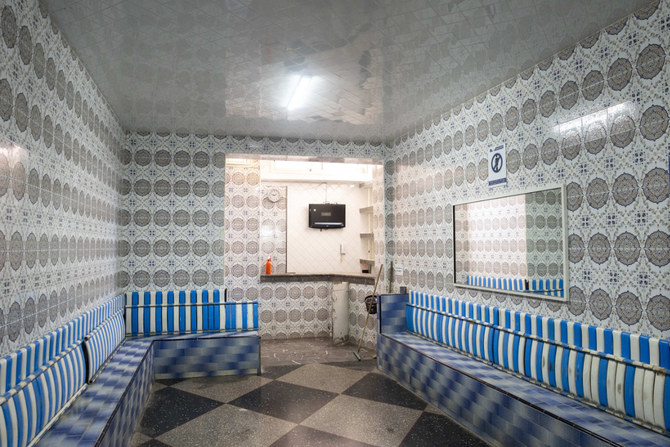RABAT, Morocco: For years, Fatima Mhattar has welcomed shopkeepers, students, bankers and retirees to Hammam El Majd, a public bath on the outskirts of Morocco’s capital, Rabat. For a handful of change, they relax in a haze of steam then are scrubbed down and rinsed off alongside their friends and neighbors.
The public baths — hammams in Arabic — for centuries have been fixtures of Moroccan life. Inside their domed chambers, men and women, regardless of social class, commune together and unwind. Bathers sit on stone slabs under mosaic tiles, lather with traditional black soap and wash with scalding water from plastic buckets.
But they’ve become the latest casualty as Morocco faces unprecedented threats from climate change and a six-year drought that officials have called disastrous. Cities throughout the North African nation have mandated that hammams close three days a week this year to save water.
Mhattar smiled as she greeted families lugging 10-liter (2.6-gallon) buckets full of towels, sandals and other bath supplies to the hammam where she works as a receptionist on a recent Sunday. But she worried about how restrictions would limit customer volume and cut into her pay.
“Even when it’s open Thursday to Sunday, most of the clients avoid coming because they are afraid it’s full of people,” Mhattar said.
Little rainfall and hotter temperatures have shrunk Morocco’s largest reservoirs, frightening farmers and municipalities that rely on their water. The country is making painful choices while reckoning with climate change and drought.
The decision to place restrictions on businesses including hammams and car washes has angered some. A chorus of hammam-goers and politicians are suggesting the government is picking winners and losers by choosing not to ration water at more upmarket hotels, pools, spas or in the country’s agricultural sector, which consumes the majority of Morocco’s water.
“This measure does not seem to be of great benefit, especially since the (hammam) sector is not considered one of the sectors that consumes the most water,” Fatima Zahra Bata, a member of Morocco’s House of Representatives, asked Interior Minister Abdelouafi Laftit in written questions last month.
Bata asked why officials in many municipalities had carved out exceptions for spas, which are typically used by wealthier people and tourists. She warned that hammam closures would “increase the fragility and suffering of this class, whose monthly income does not exceed 2,000 or 3,000 dirhams at best.” Hammam workers make an amount equivalent to $200 to $300.
Laftit has not yet responded, and his office did not respond to questions from The Associated Press.
The closures affect the roughly 200,000 people directly or indirectly employed in the hammam sector, which accounts for roughly 2 percent of the country’s total water consumption, according to Morocco’s national statistics agency.
Hammams have been closed in cities including Casablanca, Tangier and Beni Mellal since the interior minister asked local officials to enact water-saving measures earlier this year. With the price of heating gas high and temperatures dropping, the closures have raised particular concern in towns high in the Atlas Mountains where people go to hammams to warm up.
Mustapha Baradine, a carpenter in Rabat, likes to enjoy hammams with his family weekly and doesn’t understand how the modest amount of water he uses is consequential in a drought. For him, the closures have fostered resentment and raised questions about wealth, poverty and political power.
“I use only two buckets of water for me and my children,” he said. “I did not like this decision at all. It would be better if they would empty their pools,” he said of local officials.
Morocco has reduced the prevalence of poverty in recent years, but income inequality continues to plague both rural and urban areas. Despite rapid economic development in certain sectors, protests have historically arisen among working class people over disparities and rising costs of living.
Morocco’s neighbors have chosen to ration water in varying ways. In Tunisia, entire neighborhoods had their taps shut off for several hours each day last year. In part of Spain, communities were prohibited last summer from washing cars, filling swimming pools and watering gardens.
Fatima Fedouachi, the president of a hammam owners’ association in Casablanca, said the closures had changed the economics of operating a hammam. Though hammam associations have yet to publish statistics on layoffs or lost revenue, they have warned about the effect on owners, chimney technicians and receptionists.
“Owners are obligated to perform their duties for their workers,” Fedouachi said.
Even on days when they’re closed, Fedouachi said, most hammams continue burning wood to keep the baths warm rather than let them cool off and heat them again. Owners would prefer rationing for certain hours each day instead of being forced to close, she added.
Some hammam-goers say the closures appear to be raising awareness of drought, regardless of how much they save. Regulars like 37-year-old housekeeper Hanane El Moussaid support that nationwide push.
“If there’s less water, I prefer drinking over going to the hammam,” El Moussaid said.




























